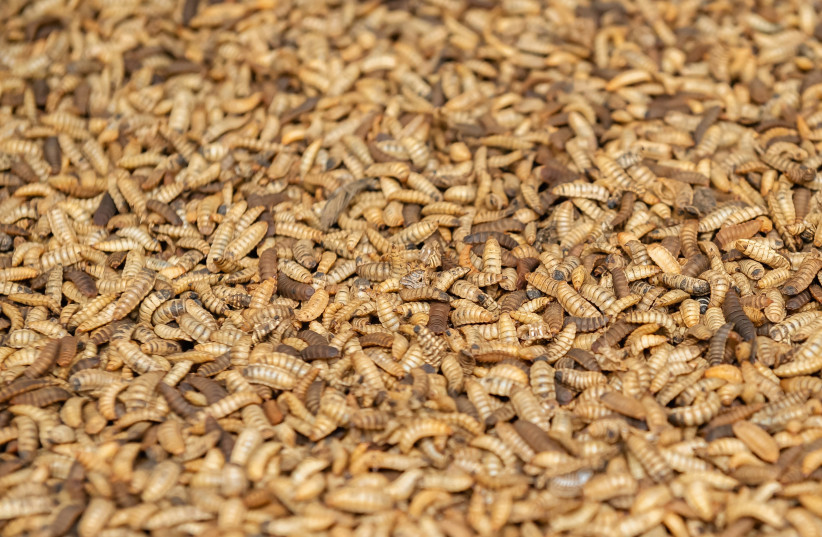The incredible anti-inflammatory properties of black soldier fly larvae
Promising anti-inflammatory properties of oil from the larvae of black soldier flies have implications to treat conditions like ulcerative colitis.
The black soldier fly (BSF) is a harmless insect that feeds on organic waste and doesn’t disturb the environment. Scientifically known as Hermetia illucens, they were named apparently because someone thought these flies, which are attracted to flowers but are not interested in humans, have stripes that look like military uniforms.
Due to their high protein levels, derivatives of BSF are very varied – from a feed oil for food processing to a source for antibiotic production. Now, a new study from the Hebrew University of Jerusalem (HU) has found that BSF oil has anti-inflammatory powers and the potential to alleviate inflammation in conditions like ulcerative colitis.
The study was led by Prof. Betty Schwartz of HU’s Faculty of Agriculture, Food and Environment in Rehovot and just published in the International Journal of Molecular Sciences under the title “Anti-Inflammatory Activity of Black Soldier Fly Oil Associated with Modulation of TLR Signaling: A Metabolomic Approach.”
Ulcerative colitis, a persistent inflammatory bowel disease, often requires people to change their diets, from saturated, long-chain fatty acids to medium-chain fatty acids (MCFAs). There are limited natural sources that contain medium-chain triglycerides – coconut oil, palm kernel oil, and cow’s and goat’s milk.
Years of suffering from chronic inflammation can damage healthy cells, tissues, and organs and may cause internal scarring, tissue death, and damage to the DNA in previously healthy cells. This process triggers the immune system to attack healthy tissue and organs in the body. If untreated, it can raise the risk for diseases like cancer, heart disease, type II diabetes, and rheumatoid arthritis.

BSFL oil is considered a sustainable dietary ingredient rich in the MCFA C12:0, but its effect on inflammatory-related conditions has not been studied until now.
BSFL oil is effective at reducing inflammation
The team found that the oil from the larvae (BSFL) is abundant in beneficial medium-chain fatty acids that reduce inflammation. By comparing its effects with a specific fatty acid (C12:0), they revealed that BSFL oil uniquely countered inflammation triggered by different immune signals, creating cellular changes that could curb inflammation.
These findings suggest that the oil, rich in medium-chain fatty acids, holds much promise as an inflammation-regulating agent, offering new avenues for future research and interventions.
The study introduces an innovative methodology, comparing the anti-inflammatory effects of BSFL oil with those of C12:0 through the activation of cell lines (THP-1 and J774A.1) by TLR4 and TLR2. The research explores the protective effects of BSFL oil against acute colitis induced by dextran sulfate sodium (DSS).
The study’s insights extended to the genetic level, revealing that BSFL oil could potentially influence cellular energy utilization and immune function through signaling pathways such as mTOR and PPAR, facilitating the utilization of fats for energy.
In contrast, the impact of C12:0 mainly revolves around cholesterol synthesis. Additionally, the study identified beneficial compounds within BSFL oil, including eicosanoids, oxylipins, and isoprenoids that seem to collaborate in reducing inflammation within the body.
BSFL devour food waste and other organic matter and is made of 60% protein, making them an attractive sustainable food source in agriculture. They have been farmed for little over a decade.
The flies are attracted to humans mostly through the carbon dioxide we exhale, sweat, dark-colored clothing, and perfumes, but they don’t bite us. The smell of exhaled carbon dioxide also attracts these bloodsucking insects to livestock and other mammals.
BSF farming has the potential to produce huge volumes of alternative insect-based products in the coming decades. Because insect oil is a major product of insect farming, it is critical to review its potential to support a healthy diet for animals, the authors concluded.


No comments:
Post a Comment
Stick to the subject, NO religion, or Party politics